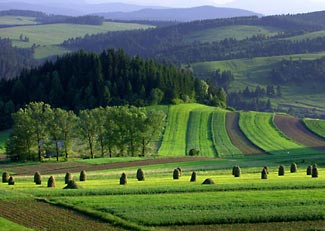

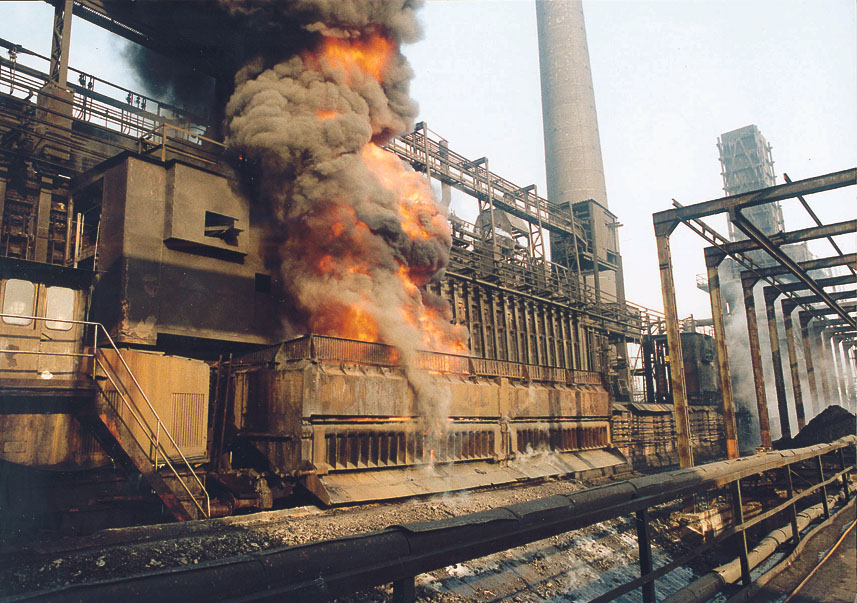
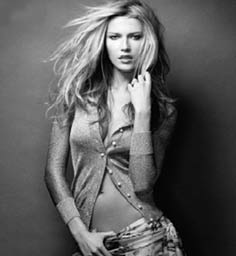
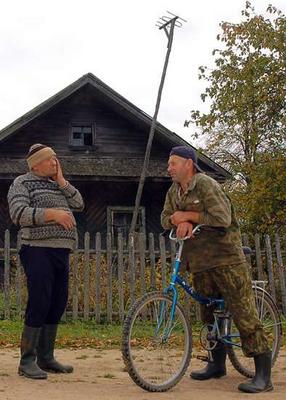

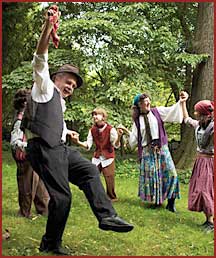
Course Description.
The course examines
Eastern Europe's evolution from the empires of the 19th Century to its
pivotal position as the "New Europe" of today. We will
explore
the influence of empire, czarism, serfdom, peasant life, Marxism,
Leninism, Stalinism, "real existing socialism," and the activities of
opposition movements and critical intellectuals on the region's
political cultures. We will learn about the post-communist
political institutions, problems and successes. And we will
contemplate how Central and Eastern Europe fits into the new world
order. Is Eastern Europe part of the new integrated Europe bound
together by its commitment to social democracy and secularism or is it
something distinctly different? Students will research several
contemporary
issues and trends in the region such as poverty and social inequality,
corruption and organized crime, and the struggle to control natural
resources.
Required Texts.
A course reader available
at the bookstore under the course number.
Bugajski, Janusz and
Ilona Teleki. 2006. America's
New Allies: Central-Eastern Europe and the Transatlantic Link.
Washington, DC: Center for Strategic and International Studies.
Levy, Daniel, Max
Pensky and John Torpey. 2005. Old Europe, New Europe, Core Europe:
Transatlantic Relations after the Iraq War. London and New
York: Verso. (ordered late; not yet in bookstore)
Roskin, Michael G. 2002. The Rebirth of East Europe. 4th Edition. Upper Saddle River, NJ: Prentice Hall.
Grading.
Grades will be calculated
according to the following formula:
Attendance: 10%
Art Reflection
Paper: 10%
Research
Paper: 20% (list of works cited due February 21 =5%)
Presentation:
10%
Midterm:
25%
Final:
25%
Art Reflection Paper.
2-5 pages choosing on of
the images from my "Behind
the Curtain" Lecture that you feel best sums up your impression of
what it was like to live behind the Iron Curtain based on what you have
learned in this course.
Research Paper and
Presentation.
Each of you will choose
one of the following topics (and the country or countries of your
choice) to be the subject of your research paper
and presentations. The paper should be 10 pages long, not
including the Works Cited page (also required). At least 10
sources must be used including at least two books and at least two
pieces of contemporary journalism. You must use APSA style.
See this site also for tips on citing
on-line sources.
You will be put into groups of 3-5 people covering the same topic for purposes of presentation. The presentation should last roughly 30 minutes, i.e., no more than 7 minutes per presenter. Power Point or a similar type of presentation software must be used. Graphics, maps, pictures, etc., must be included and you need to post your presentation to the Discussion Board for Presentations in Blackboard. Do not get bogged down in historical minutiae nor feel you have to tell us EVERYTHING there is to know about each country you researched. FOCUS ON YOUR SUBJECT.
Topics to Choose From:
Old Habits Die Hard:
Government and Police Corruption and Organized Crime in Eastern Europe
East European Movers and Shakers in the New Europe
Unemployment and Poverty:
The New Social Contract in Eastern Europe?
Eastern Europe's Greatest
Export: Women. Sex Trafficking and Mail Order Brides from
Eastern Europe
Eastern Europe's Greatest
Export: Labor. East European Migrants in Western Europe
(and the US)
Free to Believe: The Role
of Religion in Post-Communist Europe (or specific country)
The Romani in Eastern
Europe: The Status and Political Treatment of Europe's Last
Minority
National Identity and Party Politics in Eastern Europe
*Please bring a rank ordering of
three topic choices to class with you on January 24. Also list the
country or countries you are most interested in. Papers are due
on April 18.
Class Schedule:
January 17
Intro to course,
explanation of assignments.
January 22
Introduction to the
Geography of East Europe
Pre-20th Century History
of the Region: Nations, Serfdom and Peasant Family Life
Reading: Roskin, "Introduction:
East Europe as a Unit of Study" Johnson
article in the Course Reader "Nations without States, States without
Nations" and Roskin, Chpt. 1, "Caught Between Empires."
January 29
Marxist-Leninism and Its
Influence on East European Political Culture
Reading: In the
course reader, Marx and Engels, "From the Manifesto of the Communist
Party," and "From Wage Labour and Capital" In the
course reader, Lenin's "The State."
January 31
In class
instruction on how to conduct research (note: your list of sources in due
in three weeks)
Flunking Democracy and WW
II
and the Communist Takeovers
Readings: Roskin, Chpts. 2, "Flunking Democracy: The
Interwar Years," Chpt. 3 "East Europe and WWII, and Chp 4, "The
Communist Takeovers."
February 5
Stalinism and Its
Influence on East European Political Culture
Excerpts from Andrzej
Wajda's Man of Marble.
Reading: Roskin, Chpt. 5
"The Hated Regimes," and from Course
Reader: Czeslaw Milosc, "Ketman," from The Captive Mind.
February 7
"Real existing socialism"
and the New Opposition
Reading: Roskin,
Chpt. 5, "We Pretend to Work: The Decay of Communism," Kennedy
article
in the Course Reader, "The Constitution of Critical Intellectuals," pp.
281-289; Vaclav
Havel, "The Power of the
Powerless," and Adam Michnik, "A New Evolutionism."
February 12
Visual Artists from
Behind the
Curtain
Due in Class: Art
Reflection Paper
2-5 pages choosing on of
the images from my "Behind
the Curtain" Lecture that you feel best sums up your impression of
what it was like to live behind the Iron Curtain based on what you have
learned in this course.
Reading: Roskin,
Chpt. 6, "1989: The Gorbachev Factor," and Chpt. 8 "The Struggle for
Democracy."
February 14
The End of Communism, the
Beginning of "Market Democracy"
Reading: In the Course Reader
Cynthia Roberts and Thomas Sherlock, "Bringing the State Back-In:
Explanations of the Derailed Transition to Market Democracy" and
Roskin, Chpt.
10, "Lessons, Hopes and Fears."
February
19 Presidents'
Day Holiday
February 21 List of Sources for Research Paper Due!
Measures of Success in the
"New Europe"
Poland Today: Political Institutions, Political Cleavages, Role
in the New Europe
Reading: Visit Freedom House
site; look at data under Analysis and
Poland
2005
Elections
Prime Minister Jaroslaw Kaczynski
President
Lech Kaczynski
February 26
Russia Today:
Political Institutions and Putinismo
Reading: M.
Steven Fish "Rethinking Civil Society: Russia's Fourth
Transition," and "Putin's Path".
Capital as
Counterveiling Power? Not in Putin's Russia
February 28
Energy as Power: Russia's Role in the New World Order
Reading: Ukrainian
Row
Russian Natural
Gas Fight with Belarus
Belarus
Fights Back
Russia's New
Power: Energy
March 12-16 Spring Break!!
March 19
Nationalism and National
Identity in the New Europe: From Genocide to the Velvet Divorce
Reading: Roskin, Chpt. 9, "The
Horrors of Yugoslavia."
March 21
What is Europe? What
is European Identity? The EU as a Vehicle for European Identity
Reading: *Vaclav Havel. 1996. "The Hope for
Europe." The New York Review
of Books. June 20, 1996. Vol. 43(11). (On Reserve
at Foley);
and Andrei Markovits. 2005. "Anti-Americanism in
Europe: From Elite Disdain to Political Force" In Daniel
Levy, Max Pensky, and John Torpey, Eds. Old Europe, New Europe, Core Europe.
.
March 26
Some
class time for group work
The EU: European
Superstate or "New" Medieval Empire
Reading: *Jan
Zielonka. 2001. "How New Enlgarged Borders will Reshape
the European Union." Journal
of Common Market Studies, 30 (3): 507-36. (Available
electronically through Foley
Library.)
March 28
Reading: Daniel
Levy, Max Pensky and John Torpey, "Editors Introduction;" Jurgen
Habermas and Jacques Derrida,
"February 15, or, What Binds Europeans Together: Plea for a
Common
Foreign Policy Beginning in Core Europe;" Peter Esterhazy.
2005. "How Big is the European Dwarf?" and Adam Krzeminski, "From
Kant to Habermas: A Polish Perspective on 'Core Europe" in Old Europe, New Europe, Core Europe.
April 2
The New Europe and the US
Reading:
Bugajski and Teleki, Chpts. 1 and 2
April 4
The New Europe and the US
Reading:
Bugajski and Teleki, Chpts. 3 and 4
April 9 Easter
Monday
- No School
April
11
Gender and
Post-Communist Transition
My research on Eastern Europe: Women, Domestic Violence Policy as
Barometers of Democratization
Reading (on Reserve
at Foley): *Johnson,
Janet Elise
and Laura Brunell. 2006. “The Emergence of Domestic
Violence Movements and Regimes in Central and
April 16
April 25
Nationalism in Post-Communism
Presentations:
National Identity and Party Politics in EE
April 30
Civil Rights and Liberties in the New Europe
Presentations:
Free to
Believe: The Role of Religion in Post-Communist Europe
The Romani in
EE: The Status and Treatment of Europe's Last Minority
May 2
Course Summation: Europe Old and
New
Final exam questions
distributed: Due in Dr. Brunell's Office by May 9
8 p.m.